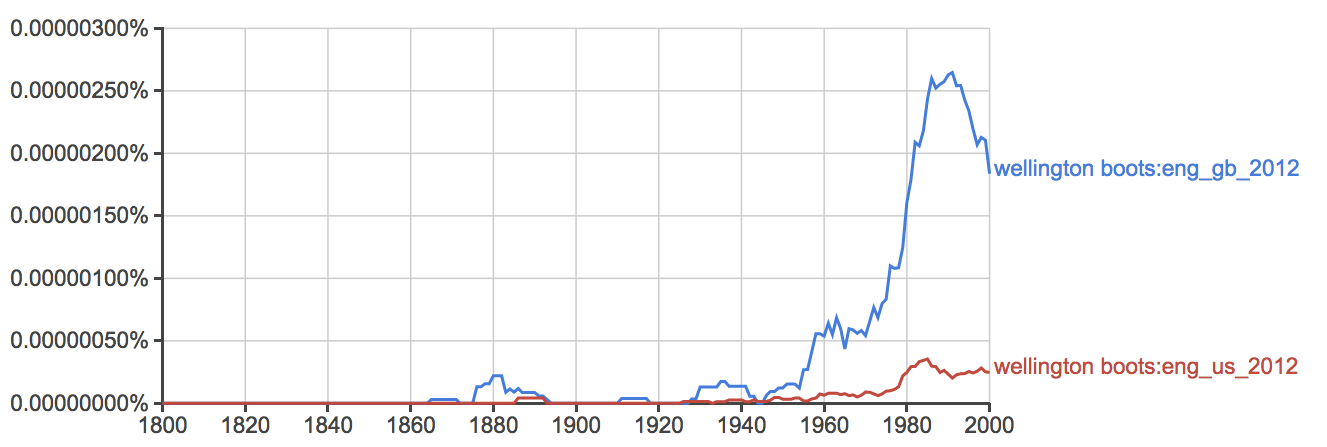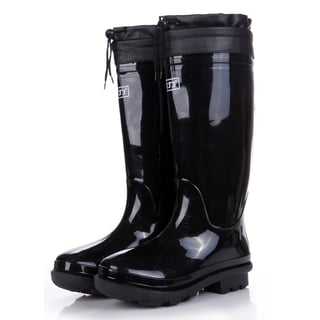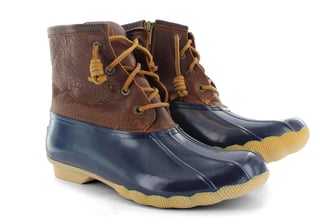I cannot find anywhere if "wellington boots" is strictly British term or Americans also use it. Are they called "rubber boots," "wellington boots" or both in American English?
-
4In a word, no. I've read the term, but likely just in stories by British authors. Close as I can tell from the descriptions below and a quick Wikipedia check, these would just be "rubber boots" in most of the US. The term "rubbers" is also used (with a slight smirk), but usually for shorter styles stopping at the ankle.– Hot LicksCommented Oct 11, 2015 at 12:34
2 Answers
According to the following source they were first made in the UK, but they are now an "international brand."
Hessian boots were unsuitable for wearing under the newly acceptable trousers, so Wellington instructed his shoemaker Hoby of St. James Street, London to modify the popular boot. The result was cut higher in front to cover and protect the knee and had the back cut away, in order to make it easier to bend the leg. It was also cut closer to the leg.
After Wellington’s defeat of Napoleon, “Wellington boots” became extremely popular as stylish footwear that could be worn with trousers.
Initially produced in limited quantities, the popularity of the rubber Wellington boot skyrocketed during World War One. The United Kingdom Office of War hired the North British Rubber Company to produce a boot suitable for the trenches in France and Belgium, and during the course of the war nearly two million Wellington boots were sold to the army.
(historicalmovies.wordpress.com)
Rubber boots is the common definition, Wellington is a brand that came to be closely associated with 'rubber boots'. The term is more popular in the UK as far as I know.
-
5Wellington boots is in any event a very bourgeois description. Norfolk farm workers, when I was growing up there in the 1950s would never have used such a term - they were always known as water boots. This was 'elevated' to rubber boots unless people were very posh and said to their children 'put on your Wellingtons'. I remember looking dumbfounded at a teacher who used the term, which I had never before heard. However in todays society the abbreviated welly boots has become classless and almost universal.– WS2Commented Oct 11, 2015 at 8:53
-
4It seems very odd to say that Wellington is a brand name, but I suppose someone may have set up a company of that name to make boots, playing on the association with the Iron Duke.– Andrew Leach ♦Commented Oct 11, 2015 at 9:22
-
@Andrew, you are right, I didn't want to mention the real brand which advertises 'Wellington boots' . I'll use inverted commas.– user66974Commented Oct 11, 2015 at 9:25
-
2In my experience, the only 'brand name' for wellies that has any widespread recognition in the UK is Hunter. They do have a 'posh' or bourgeois image, which probably works both for and against them. (Disclaimer: I have no connection etc.)– JHCLCommented Oct 11, 2015 at 9:27
-
1@WS2 Welly boots? I don't think I've ever heard anyone say that—always either Wellington boots or just wellies. A Google search for the exact phrase also turns up mostly references to wellies and Wellington boots. I wonder if welly boots is a dialectal form, or just a less common one. Commented Dec 29, 2016 at 18:03
Here is one narrow case where google NGrams really shows the difference in frequency well:
 From Google NGrams Dec 2016
From Google NGrams Dec 2016
The graph shows that the term wellington boots, which is very specific, is roughly 10 times the frequency in UK books as US books.
What the alternative is in the US for boots that have been made waterproof, there are other more common terms:
- rubber boots or water boots
These seem to be the closest to wellington boots or, more colloquially, 'wellies'.
- duck boots (for a very particular construction kind of boot)
Duck boots are constructed distinctly differently from regular/normal/canonical boots, having a rubber sole and toe/top of foot/heel covering, but with a separate leather ankle lower calf covering.
These (the footwear as well as the term) are common in the US.
-
1I'm from the US and had never heard the term 'wellington boots' before this question, but had heard of 'wellies' to refer to waterproof boots by UKers. I grew up with both the term and thing called 'duck boots'. Also regular old boots, waterproof or not.– MitchCommented Dec 29, 2016 at 17:13
-
I think you can include the comment in the answer. Why not? Happy New year!– user140086Commented Dec 29, 2016 at 17:16
-
The first I would refer to as galoshes, although apparently in Britain this is something else, and I know that term only from Sesame Street. Admittedly, while I have lived in some wet parts of the U.S., I have never lived any place where sidewalks were so lacking or ill-maintained and the roads so ill-drained that they would be justified.– chosterCommented Dec 29, 2016 at 19:26
-
@choster Are you a primarily AmE or BrE speaker/culture? I use 'galoshes' (I've heard as a synonym for 'rubbers', which word is also polysemically/amphbolistically a synonym for the tabooistical/snickerrific 'condom') for slightly elastic rubber shoe covers, things you temporarily slide over your regular shoes, and pull off when you go back inside without having to change your regular day shoes into we weather ones. Those things, galoshes, I haven't seen since the 70's though. Boots (and also duck boots) are as common as ever.– MitchCommented Dec 29, 2016 at 19:44
-
@Mitch AmE, bicoastal, b. 1975. Duck boots I'm familiar with; they were de rigeur even in college in the grungy '90s, though I usually wore winter hiking boots to class. The WP article seems to cover the footwear you describe; I've never seen or heard of such things. Sesame Street, for what it's worth, still uses the term to refer to rubber boots, not rubber overshoes.– chosterCommented Dec 29, 2016 at 20:05


